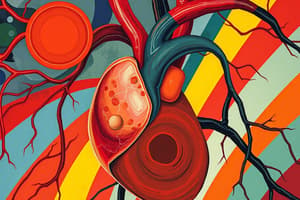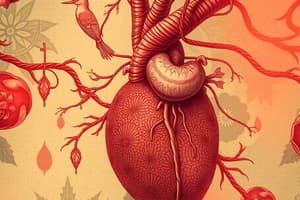Podcast
Questions and Answers
What mediates platelet adhesion to the extracellular matrix?
What mediates platelet adhesion to the extracellular matrix?
- Thrombin
- Plasminogen
- von Willebrand factor (vWF) (correct)
- Fibrinogen
Which substance is released from dense body granules during platelet secretion?
Which substance is released from dense body granules during platelet secretion?
- Fibrinogen
- Prothrombin
- Histamine (correct)
- Thromboxane A2
What is the primary stimulus for platelet aggregation?
What is the primary stimulus for platelet aggregation?
- Adenosine monophosphate (AMP)
- Vascular endothelial growth factor (VEGF)
- Thromboxane A2 (TXA2) (correct)
- Platelet-activating factor (PAF)
What process leads to the formation of an irreversible hemostatic plug?
What process leads to the formation of an irreversible hemostatic plug?
Which of the following triggers the secretion of tissue factor in endothelial cells?
Which of the following triggers the secretion of tissue factor in endothelial cells?
What role does plasminogen activator inhibitor (PAI) have in the context of hemostasis?
What role does plasminogen activator inhibitor (PAI) have in the context of hemostasis?
What is the significance of the interaction between thrombin and the platelet surface receptor PAR?
What is the significance of the interaction between thrombin and the platelet surface receptor PAR?
What is the main component of the definitive secondary hemostatic plug?
What is the main component of the definitive secondary hemostatic plug?
What role does thrombin play in the coagulation process?
What role does thrombin play in the coagulation process?
What is the result of fibrin polymerization in the hemostatic process?
What is the result of fibrin polymerization in the hemostatic process?
Which natural anticoagulants help control clotting in the body?
Which natural anticoagulants help control clotting in the body?
What initiates the fibrinolytic cascade after clot formation?
What initiates the fibrinolytic cascade after clot formation?
What is the primary function of plasmin in the coagulation process?
What is the primary function of plasmin in the coagulation process?
How is plasminogen activated in the body?
How is plasminogen activated in the body?
Which of the following tests assess the coagulation assay?
Which of the following tests assess the coagulation assay?
What happens to free plasmin in the circulatory system?
What happens to free plasmin in the circulatory system?
What direction do arterial thrombi typically grow from their point of attachment?
What direction do arterial thrombi typically grow from their point of attachment?
What is a characteristic of venous thrombi in comparison to arterial thrombi?
What is a characteristic of venous thrombi in comparison to arterial thrombi?
What term describes thrombi occurring in heart chambers or the aortic lumen?
What term describes thrombi occurring in heart chambers or the aortic lumen?
What is the primary compositional difference between arterial and venous thrombi?
What is the primary compositional difference between arterial and venous thrombi?
Which of the following is a potential clinical risk associated with venous thrombi?
Which of the following is a potential clinical risk associated with venous thrombi?
What is the role of platelets in venous thrombosis compared to arterial thrombosis?
What is the role of platelets in venous thrombosis compared to arterial thrombosis?
What happens to a thrombus over time?
What happens to a thrombus over time?
Which of these components are mostly found in venous thrombi due to sluggish blood flow?
Which of these components are mostly found in venous thrombi due to sluggish blood flow?
What is the primary function of the endothelium in maintaining hemostasis?
What is the primary function of the endothelium in maintaining hemostasis?
Which components are involved in both hemostasis and thrombosis?
Which components are involved in both hemostasis and thrombosis?
Which molecule is NOT associated with anti-platelet effects of endothelial cells?
Which molecule is NOT associated with anti-platelet effects of endothelial cells?
What happens when endothelial cells are injured or activated?
What happens when endothelial cells are injured or activated?
What do heparin-like molecules and thrombomodulin have in common?
What do heparin-like molecules and thrombomodulin have in common?
Which of the following describes the primary consequence of normal hemostasis?
Which of the following describes the primary consequence of normal hemostasis?
What is the main role of the coagulation cascade in hemostasis?
What is the main role of the coagulation cascade in hemostasis?
What effect does the intact endothelium have on blood flow?
What effect does the intact endothelium have on blood flow?
Where do most venous thrombi typically occur?
Where do most venous thrombi typically occur?
Which type of venous thrombosis is less likely to embolize?
Which type of venous thrombosis is less likely to embolize?
What can cause deep venous thrombosis besides stasis?
What can cause deep venous thrombosis besides stasis?
What is a major initiator of thrombosis?
What is a major initiator of thrombosis?
What percentage of emboli is represented by dislodged thrombus?
What percentage of emboli is represented by dislodged thrombus?
What complication can arise from thromboembolism?
What complication can arise from thromboembolism?
What is the annual death toll caused by pulmonary embolism in the United States?
What is the annual death toll caused by pulmonary embolism in the United States?
Which condition can lead to the formation of atrial mural thrombi?
Which condition can lead to the formation of atrial mural thrombi?
Flashcards are hidden until you start studying
Study Notes
Hemodynamic Disorders, Thrombosis, and Shock
- Cell and tissue health relies on intact circulation for oxygen delivery and waste removal.
- Normal fluid homeostasis keeps blood in a liquid state until clotting is necessary.
Hemostasis and Thrombosis
- Normal hemostasis involves processes that maintain clog-free blood flow while enabling localized clot formation at injury sites.
- Three components of hemostasis and thrombosis: vascular wall, platelets, coagulation cascade.
Endothelium
- Endothelial cells regulate both pro- and anti-thrombotic activities.
- Balance between these activities influences thrombus formation, propagation, or dissolution.
- Antithrombotic properties include:
- Antiplatelet effects: Prevent platelets from adhering and aggregating.
- Anticoagulant effects: Inhibition of the coagulation cascade via heparin-like molecules and thrombomodulin.
- Fibrinolytic effects: Enable clot dissolution using plasminogen activator (t-PA).
Prothrombotic Properties
- Injury to endothelium promotes platelet adhesion through von Willebrand factor (vWF).
- Endothelial cells can produce tissue factor, initiating the extrinsic clotting cascade, especially in response to cytokines.
- Antifibrinolytic effects include secretion of plasminogen activator inhibitors (PAIs).
Platelets
- Central to normal hemostasis, platelets adhere to the extracellular matrix mediated by vWF.
- Platelet activation leads to granule secretion, releasing ADP, calcium, histamine, and other substances.
- Aggregation occurs through ADP and thromboxane A2 (TXA2), forming a reversible primary hemostatic plug.
- Thrombin enhances irreversible aggregation and converts fibrinogen to fibrin, solidifying the secondary hemostatic plug.
Coagulation Cascade
- Consists of a series of enzymatic conversions leading to thrombin production, which converts fibrinogen into fibrin.
- Restriction of coagulation to the injury site is critical to prevent excessive clotting.
- Natural anticoagulants like antithrombin III, proteins C and S, and tissue factor pathway inhibitor (TFPI) regulate this process.
- Fibrinolysis, primarily through plasmin, counteracts clot formation, ensuring balance.
Thrombus Characteristics
- Thrombus size and shape depend on origin and cause; arterial thrombi grow retrograde while venous thrombi follow blood flow.
- Thrombi show lines of Zahn, indicative of layered structure.
- Mural thrombi can occur in heart chambers and the aorta, often occlusive and composed of platelets and fibrin.
Clinical Correlations
- Venous thrombi lead to tissue congestion distal to blockages and can embolize to the lungs, posing a significant risk of death.
- Arterial thrombi are critical due to their potential to cause significant vascular obstruction, especially in coronary and cerebral vessels.
- Most venous thrombi occur in the legs, especially within deep veins, with superficial thrombi being less likely to embolize.
Embolism
- An embolus is a detached mass that travels through the bloodstream, often resulting from dislodged thrombi (thromboembolism).
- Other embolus types include fat droplets, air bubbles, cholesterol debris, and tumor fragments.
- Consequences of thromboembolism include tissue ischemia and necrosis (infarction).
Pulmonary Thromboembolism
- Incidence is 20 to 25 per 100,000 hospitalized patients, contributing to around 200,000 deaths annually in the U.S.
- Improvement noted in fatality rates from 6% to 2% over the past quarter century.
Studying That Suits You
Use AI to generate personalized quizzes and flashcards to suit your learning preferences.




